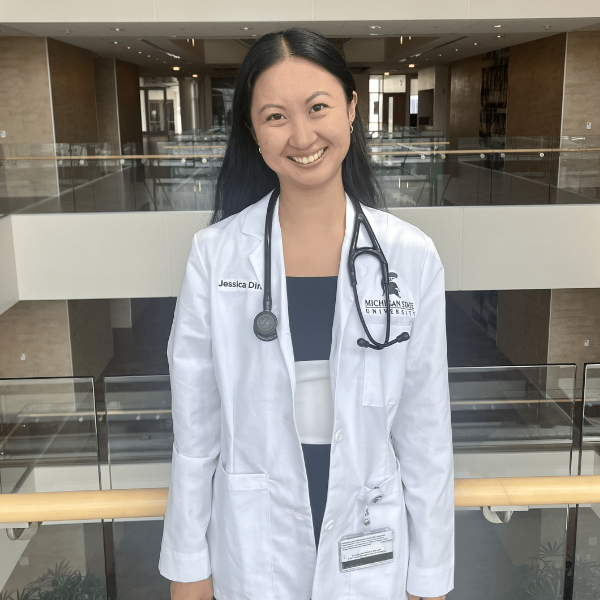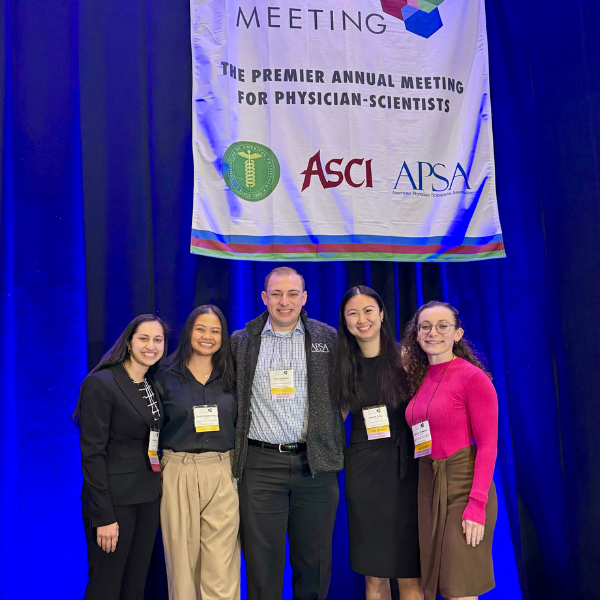College of Human Medicine student Jessica Ding elected president of American Physician Scientists Association
November 17, 2025
 Jessica Ding is no stranger to taking on a number of disciplines at once.
Jessica Ding is no stranger to taking on a number of disciplines at once.
When she was a Harvard undergraduate studying anthropology, Ding was dually enrolled in the New England Conservatory where she earned a Master of Music.
Ding is continuing that dual lifestyle at Michigan State University as a student in the MD-PhD program. This pathway has led her to becoming the first American Physician Scientists Association (APSA) president to pursue a PhD in the social sciences.
Just as her harp gives her the ability to bridge art and science through sound, Ding hopes her current role as president-elect will bring more visibility to anthropology and how it partners with medicine.
“After doing medical anthropology research in the hospital setting and getting a sense of clinical training, I began to explore the dual degree and think that it's such a valuable path where both degrees constantly inform each other,” Ding said.
The APSA is a national organization made up of more than two thousand members. The group works to advocate and further career development for physician-scientist trainees.
“Students in our program have been actively involved in APSA for many years. Having one of ours as president of that organization continues that tradition and speaks to the involvement of our students in the larger physician-scientist training community as a whole,” said Cindy Arvidson, PhD, College of Human Medicine MD-PhD program director.
 Ding hopes to advance and expand APSA resources for students who want to pursue the MD-PhD path. She points out that because it's less common, the application process for a social science MD-PhD can be frustrating.
Ding hopes to advance and expand APSA resources for students who want to pursue the MD-PhD path. She points out that because it's less common, the application process for a social science MD-PhD can be frustrating.
Mentor and an MD-PhD, himself, Charles Hong, chair of the Department of Medicine, hopes Ding’s election to this leadership role will stimulate the College of Human Medicine’s commitment to research and clinician-scientist training.
“This places her at the helm of an important student organization that helps to define the future of academic medicine. This is a big deal.”
Hong points out the College of Human Medicine’s MD-PhD program is “small, but mighty.” Arvidson said its size doesn’t hold back the program from offering a flexible curriculum and allowing students to access research opportunities across the university with partners at the Van Andel Institute and Henry Ford Health System.
Ding credits her small group leader, Kirstin Parkin, PhD, and the dual degree dinners where MD-PhD, DO-PhD, and DVM-PhD trainees gather to listen to an invited speaker as sources of mentorship and community.
Hong worries the pipeline of future medical innovators is under threat, so their voices are vitally important to the future health of our country. He said Ding is well positioned to continue the critical work of physician scientists, by furthering the College of Human Medicine’s mission along with her own.
“I hope that my clinical experiences will point me toward the direction of health care gaps and needs, and I will be able to use my anthropological skills to tease out the structural and social dimensions that are critical to consider when implementing new policy,” she said.
Ding’s role as president begins in spring 2026.
By Emily Linnert

